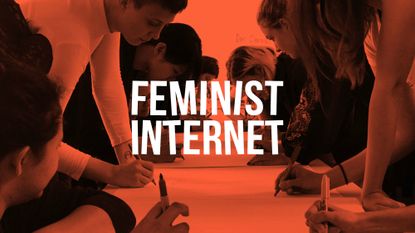The Feminist Internet exists and it’s pretty incredible
Created by a group of artists and designers, the Feminist Internet seeks to advance internet equality for women and other marginalised groups


Created by a group of artists and designers, the Feminist Internet seeks to advance internet equality for women and other marginalised groups
Ah, the internet. As much as we couldn’t live without it, what we could live without is the underlying cesspool of misogyny that often bubbles over: pro-rape groups are given platforms and female figures are targeted with sexist-based hate on the regular.
Human rights organisation Amnesty International reported on how toxic Twitter is for women - and we totally get it.
If only there was a way to change this...enter the Feminist Internet.
Dr Charlotte Webb, founder of the Feminist Internet, wanted to create change, and started the programme as an intensive educational experiment at University of the Arts London.
Sixteen students spent ten days creating the Feminist Internet Manifesto, with the aim of advancing internet equalities for women and other marginalised groups.
Within these first ten days, the participants came up with some innovative ideas, including the ‘Hollabot’ - an app that detects online abuse and harassment, and makes the perpetrators do online community service, and ‘ELI’ an ‘Empathic Living Intelligence system’ that helps resolve domestic conflicts.
Marie Claire Newsletter
Celebrity news, beauty, fashion advice, and fascinating features, delivered straight to your inbox!
Since then, the project has gone from strength to strength: Dr Webb stresses that these developments were only the beginning, and that it ‘feels like there’s a real appetite for the work we’re doing.’ Feminist Internet is currently working on alternatives to electronic personal assistants such as Alexa and Siri, who they say are highly-gendered and reinforce deeply engrained social stereotypes about women.
With Plan International UK’s findings that almost half of teenage girls in the UK have experienced some form of harassment on social media, it’s no surprise that the Feminist Internet has identified this area as one that needs a serious culture change. They're calling for a safer and more balanced social media environment, where no one is censored or policed on the basis of their race, class, gender, age or ability.
Is this the feminist revolution that the internet has been waiting for? We really hope so.
The Feminist Internet is supported by UAL, Europe's largest university focused on art and design.
-
 Ryan Gosling has revealed the sweet name his children have for co-star Emily Blunt
Ryan Gosling has revealed the sweet name his children have for co-star Emily BluntBy Jenny Proudfoot
-
 The Power Issue
The Power IssueFrom the latest looks to ramp-up your wardrobe to resilience tips from female trailblazers, we’re channelling this month’s cover star, Shakira, and reclaiming our power
By Marie Claire
-
 Shakira: On music, motherhood and reclaiming her power
Shakira: On music, motherhood and reclaiming her powerBy Andrea Thompson